Google is holding its annual I/O event today, where it’s already outlined a range of new and coming advances to Search, Google ads, visual creation elements and more.
And as is the theme of 2023, AI has been the big focus, as Google looks to showcase its own developments and advances on the generative AI front.
Here’s a look at the key announcements from I/O relating to Google marketers and SEO.
First off, Google has outlined how it’s looking to ‘transform Search with new AI-powered capabilities’.
As noted in the video, Google has been working on AI elements for many years, but thus far, those have mostly remained in-house as part of the back-end of Search. But with Microsoft looking to ride the generative AI wave, via its investment in OpenAI, that’s forced Google’s hand to some degree, which will now see the search giant integrate a range of new generative AI tools into Google Search direct.
As per Google:
“With new generative AI capabilities in Search, we’re now taking more of the work out of searching, so you’ll be able to understand a topic faster, uncover new viewpoints and insights, and get things done more easily. Let’s take a question like ‘what’s better for a family with kids under 3 and a dog, bryce canyon or arches’. Normally, you might break this one question down into smaller ones, sort through the vast information available, and start to piece things together yourself. With generative AI, Search can do some of that heavy lifting for you.”
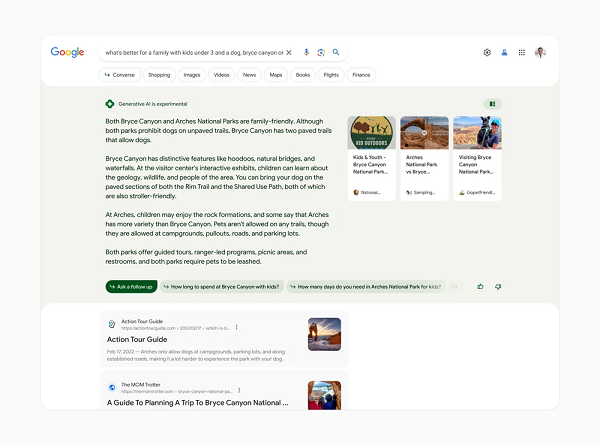
As you can see, using Google’s new generative AI responses, you’ll now be able to get customized responses, based on any query, while you’ll also be able to ask follow up questions to refine those answers, by tapping the ‘Ask a follow-up’ prompt.
It’s very similar to Microsoft’s integration of OpenAI’s generative responses in Bing, which has proven increasingly popular – though Google has also warned against rushing into AI answers in search, due to concerns around false positives and the spread of misinformation in generated results.
So you would assume that Google has ironed out similar issues with its AI elements. Which it kind of has, though it is also warning that errors will happen in its AI answers.
“We’re taking a responsible and deliberate approach to bringing new generative AI capabilities to Search. We’ve trained these models to uphold Search’s high bar for quality, and we will continue to make improvements over time. They rely on our hallmark systems that we’ve fine-tuned for decades, and we’ve also applied additional guardrails, like limiting the types of queries where these capabilities will appear.”
Given it’s more slow and steady approach to incorporating AI, I do expect that Google’s processes will be more aligned with safety than other platforms, but there’s no way of knowing exactly how these systems will respond to each user query. Still, Google says that it will iterate based on user feedback, and continue to improve its AI results over time, as it addresses issues and errors.
Google’s generative AI tools will also be expanded to shopping results, and helping users make comparisons between products.
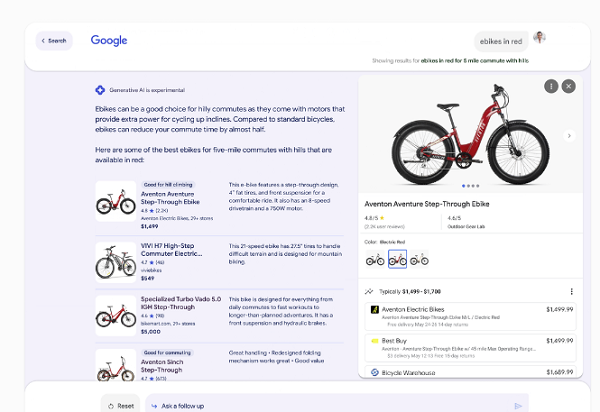
As you can see in this example, Google’s generative AI elements for shopping will provide insights into key elements to consider when making a purchase in a given category.
“You’ll also get product descriptions that include relevant, up-to-date reviews, ratings, prices and product images. That’s because this new generative AI shopping experience is built on Google’s Shopping Graph, which has more than 35 billion product listings – making it the world’s most comprehensive dataset of constantly-changing products, sellers, brands, reviews and inventory out there.”
That could be a big tick in Google’s favor on this front, with a wider corpus of product insights and images to showcase, based on AI-defined response.
At the same time, Google’s wary of eating into its core Search ads business, which it says will remain a priority within this new shift.
“We believe that ads are a vital piece of how the web works, and help people find relevant products and services. In this new generative experience, Search ads will continue to appear in dedicated ad slots throughout the page. And we’ll continue to uphold our commitment to ads transparency and making sure ads are distinguishable from organic search results.”
Google also says that it’s ‘committed to continue sending valuable traffic to sites across the web’, which is good news for marketers, though it’s impossible to tell, at this stage, what the impacts of generative results will have on web traffic.
You would assume, with more information being presented in-stream, that would mean that people are less likely to tap through on a Search result, but we can only take Google’s word on this, and see what the impacts are over time.
Google’s also rolling out its generative AI creation tool Bard to more regions, while it’s also adding more capacity to generate Bard responses from multiple inputs – like adding an image into your query.
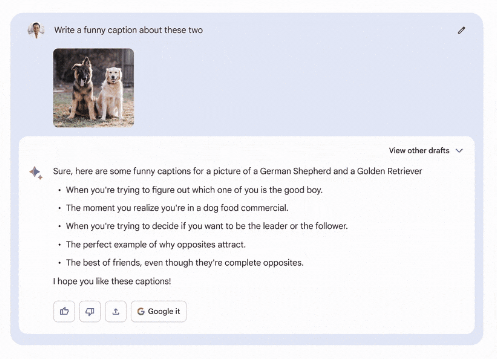
On another front, Google’s also adding a new ‘Perspectives’ element to selected Search results, which will provide more human insight into specific elements.

“In the coming weeks, when you search for something that might benefit from the experiences of others, you may see a Perspectives filter appear at the top of search results. Tap the filter, and you’ll exclusively see long- and short-form videos, images and written posts that people have shared on discussion boards, Q&A sites and social media platforms. We’ll also show more details about the creators of this content, such as their name, profile photo or information about the popularity of their content.”
It seems like Google has taken notes about people increasingly using Reddit to refine their Search queries, and get real insights from actual people when searching for content, with the added examples providing additional, real-life experiences that can deepen the context of your Search results.
There’s also an important note for marketers on this:
“We’re also improving how we rank results in Search overall, with a greater focus on content with unique expertise and experience. Last year, we launched the helpful content system to show more content made for people, and less content made to attract clicks. In the coming months, we’ll roll out an update to this system that more deeply understands content created from a personal or expert point of view, allowing us to rank more of this useful information on Search.”
Insights from real people could become a bigger SEO factor, something to keep in mind when building out your content library.
Google’s also launching new improvements to its photo editing tools, including enhanced capacity to shift core elements within an image frame.
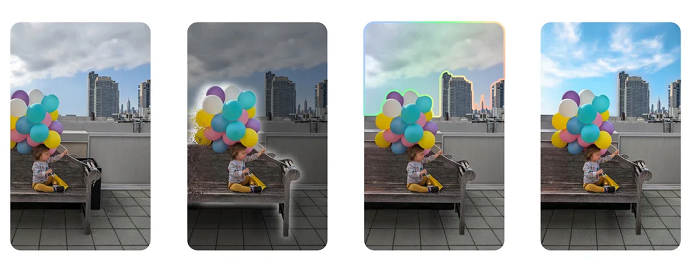
“Using a combination of AI techniques, including generative AI, Magic Editor will help you make edits to specific parts of an image – like the subject, sky or background – so you have even more control over the final look and feel of your photo.”
The new editing tools will be launched on Pixel phones later this year.
Google’s also looking to mitigate the risks associated with the rise of generative AI images in Search, by adding new informational tools that will help users determine whether images displayed in Search are real or not, via further contextual links.
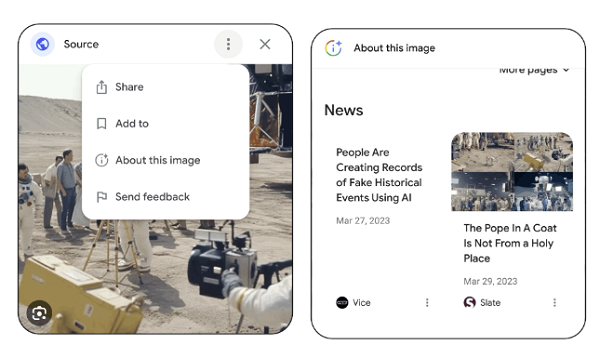
Google’s new ‘About this image’ element will give users more context as to the origins of an image, while also providing news updates and other relevant notes about potential fakes, things to watch for, etc.
Google will also start labeling images generated with AI in Search, where possible, including visuals generated by its own AI tools like Bard.
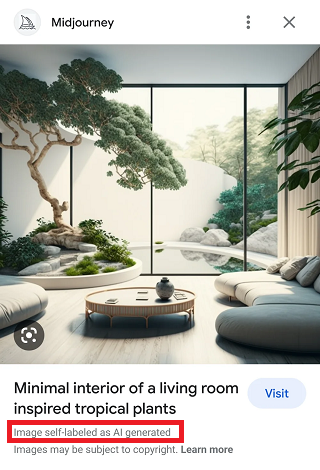
There’s a heap to take-in here, and a heap of changes that could have a big impact on how Google Search works, and how people use it, which will subsequently have big impacts for brands looking to maximize reach and response via the same, and it’s worth considering if and how each of these elements will factor into your process, as you consider the future of Search and generative AI elements.
Because these new processes are here, and they’re being used more and more every day. Rather than avoiding them, you need to be proactive in educating yourself about how they work, and their capacity to change discovery moving forward.
A lot to consider – you can learn more about each specific element of Google’s I/O announcements via the above links.



